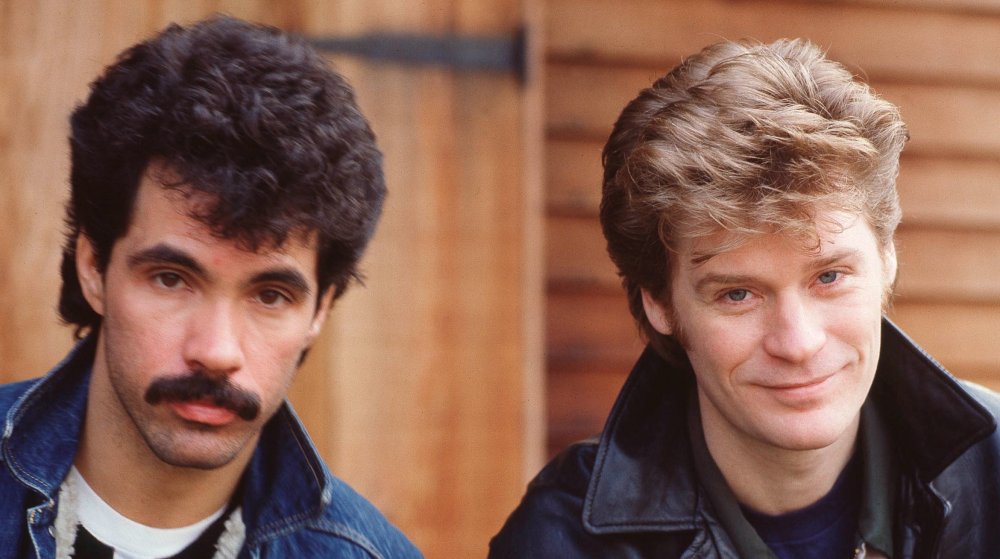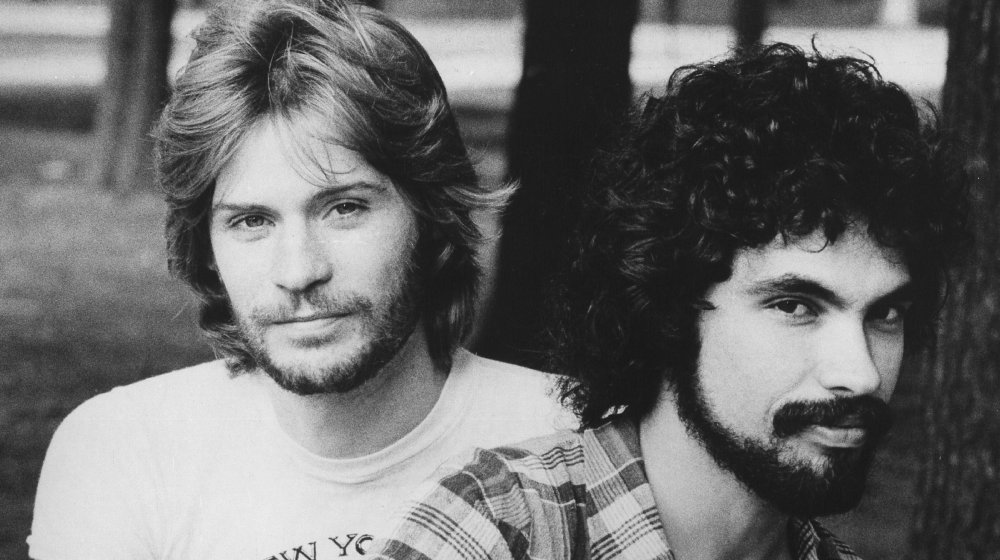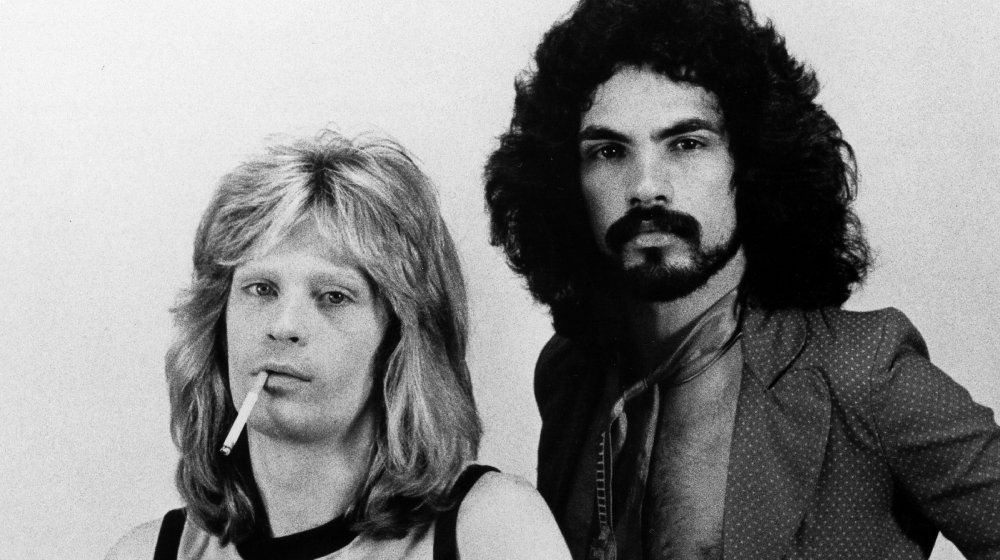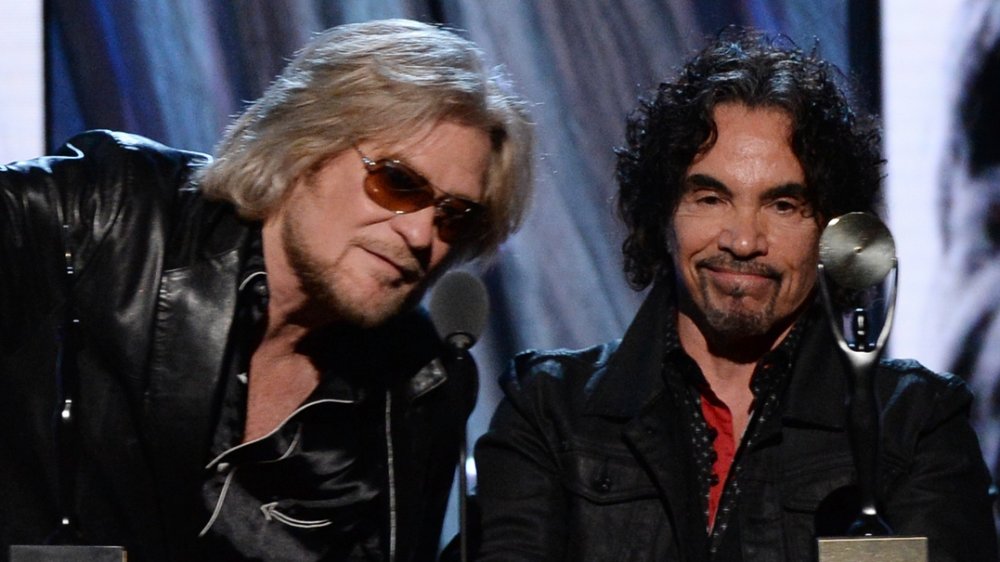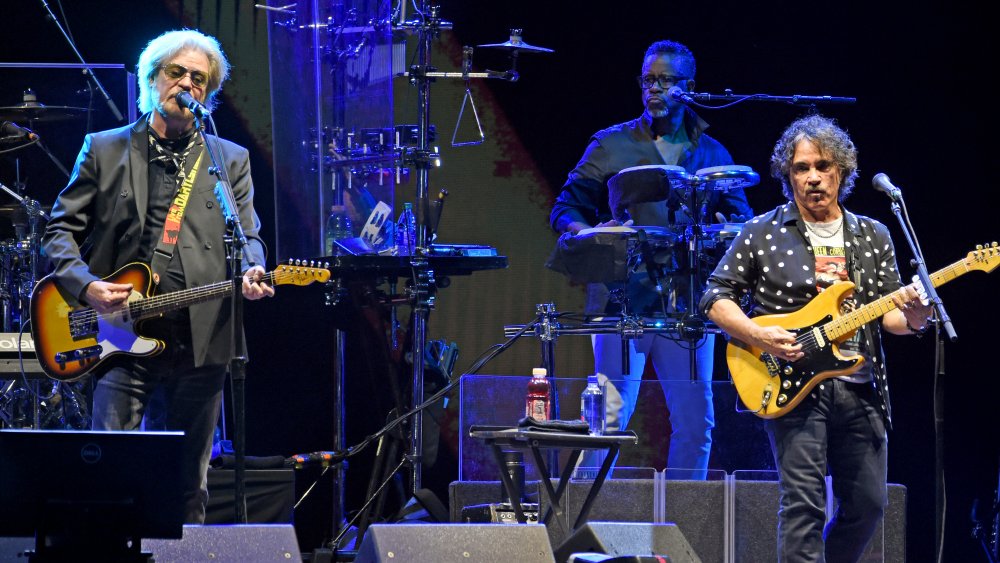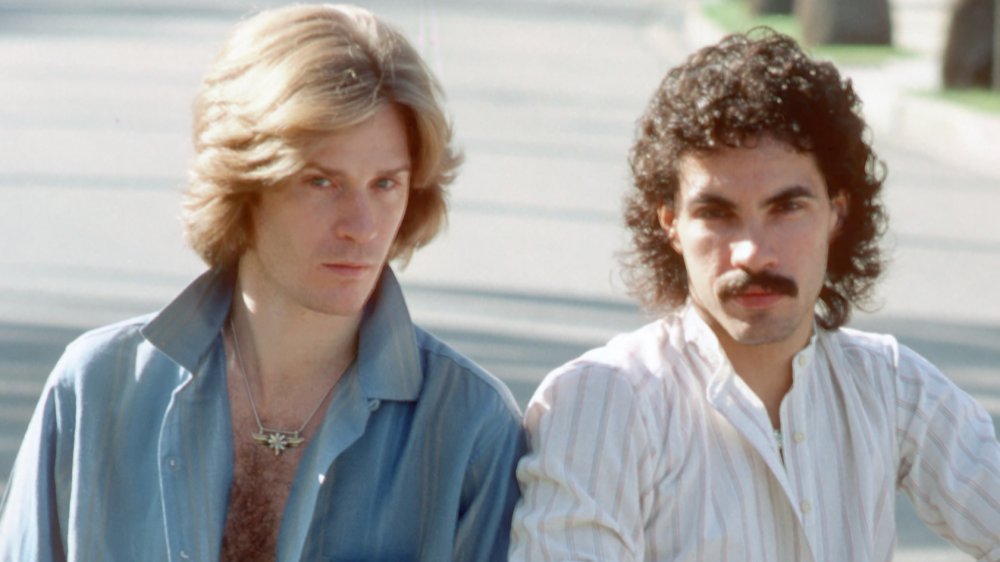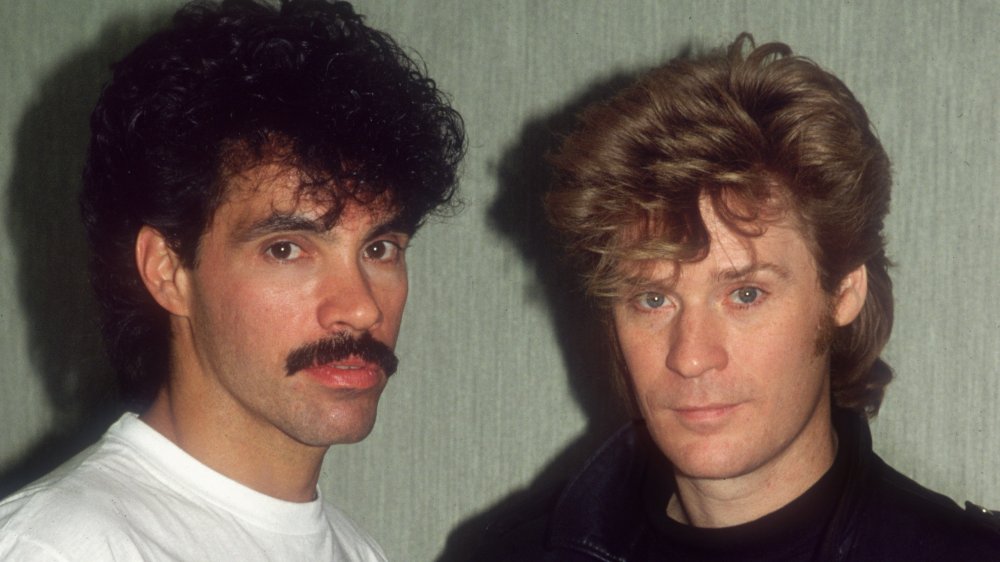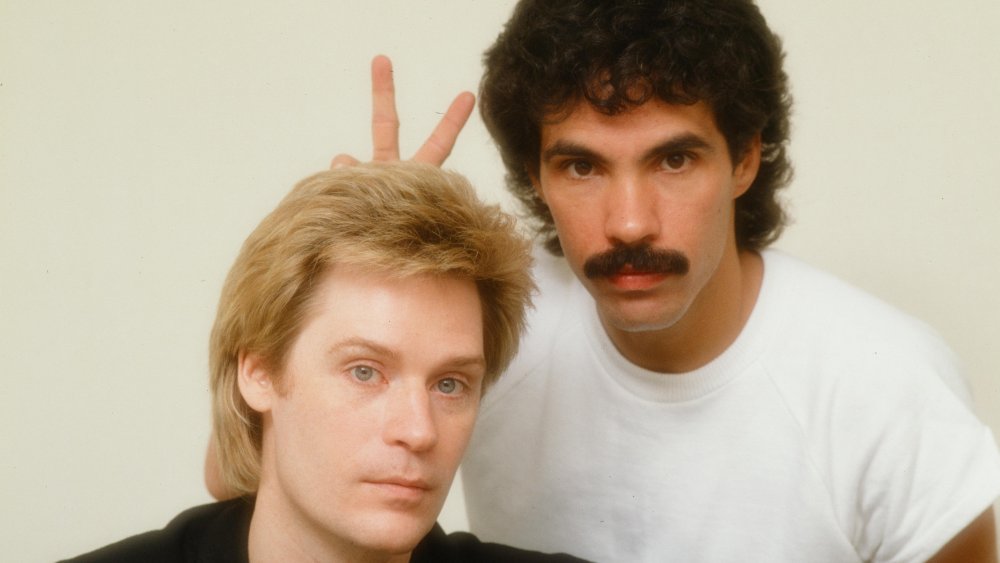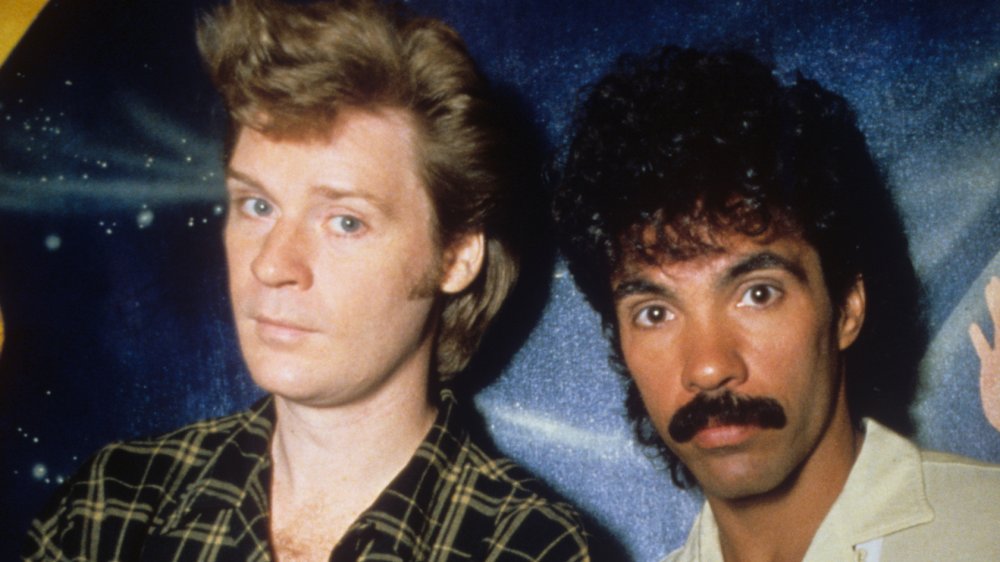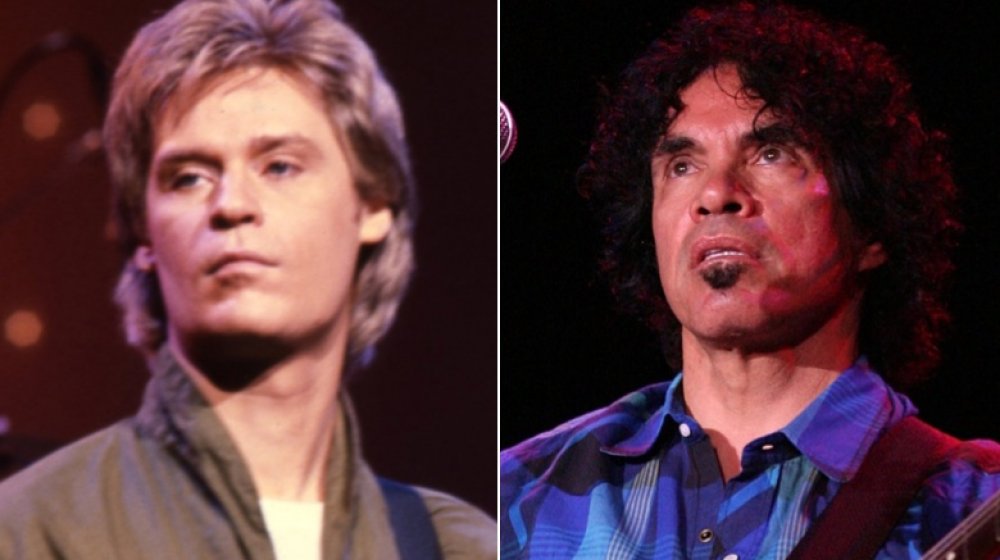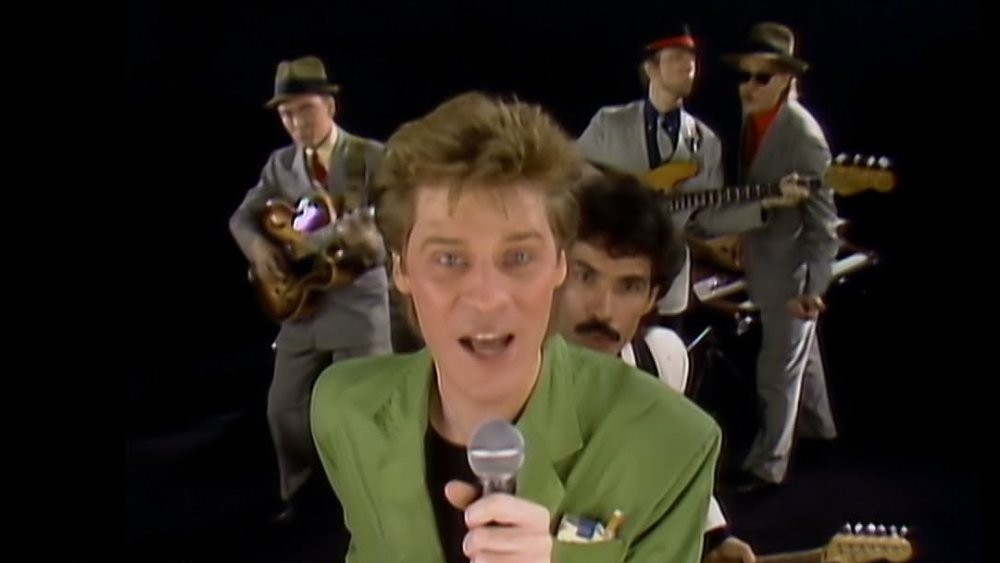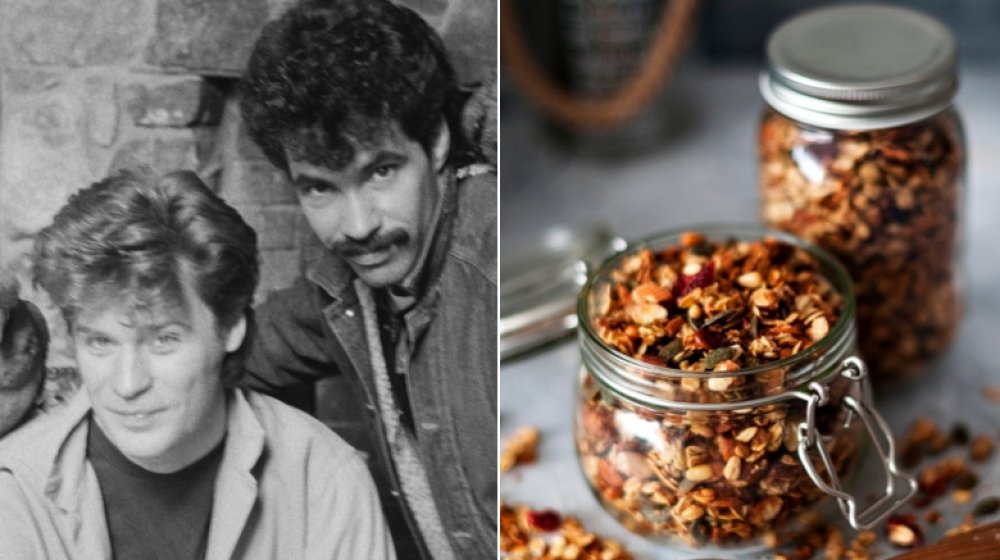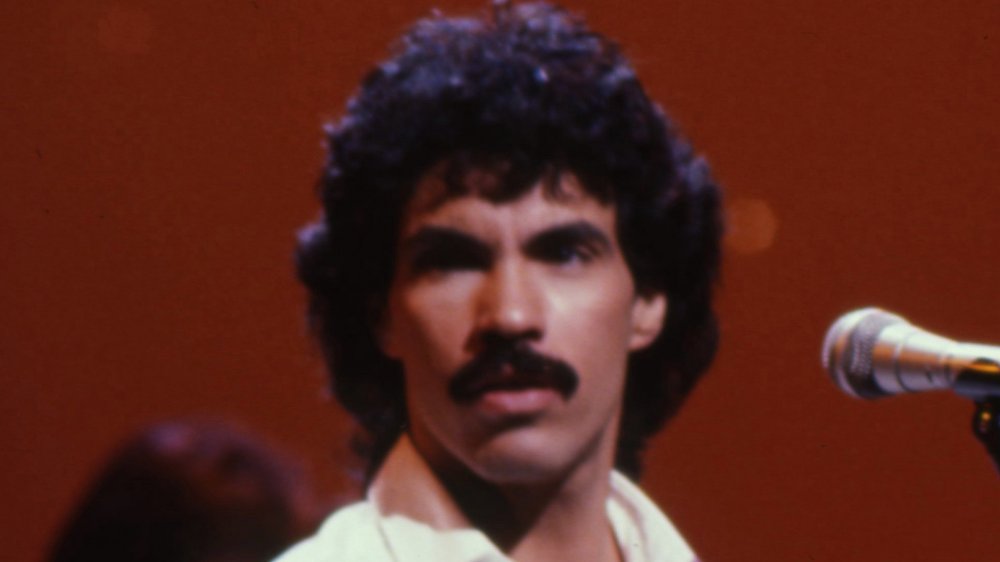What Fans Might Not Know About Hall & Oates
Daryl Hall and John Oates — or just plain Hall and Oates — are one of the most successful groups in rock music history, and altogether the biggest ever two-man act. In the 1970s, and especially in the 1980s, the combination of the honey-smooth voice of Daryl Hall and the choppy guitar work of John Oates, propelled one soulful, poppy, edgy hit after another. The pair topped the charts and then held a spot on almost every soft rock radio station's playlist until the end of time. Among the catchy, familiar, and totally irresistible songs in the Hall and Oates canon of classics: "Rich Girl," "She's Gone," "Sara Smile," "You Make My Dreams," "Private Eyes," "Maneater," "I Can't Go For That (No Can Do)," and "Kiss On My List."
Hall and Oates live on through not just their music, but via their goofy music videos, enshrinement in the Rock and Roll Hall of Fame, and regular concert tours. Here's a look back to those heady years when that blond guy (Hall) and the man with the mustache (Oates) helped rule over American popular music.
When Hall met Oates
As a teenager growing up in Philadelphia in the 1960s, Daryl Hall was a member of a vocal group called the Temptones, and in 1967, they were scheduled to perform at the Adelphi Ballroom in West Philadelphia. Lots of R&B groups were on the lineup that night, including the Masters, a band that counted local musician John Oates among its members. "Suddenly, right before we were due to go on, a fight broke out between rival high-school fraternities," Hall told The Independent. "There were chains and knives and shots rang out. Obviously the show was over." The ballroom was on a higher floor of the building and to escape unscathed, Hall had to hop into a large elevator. Oates was already on board, and they started talking, commiserating about how neither of their groups got to perform that night, and realizing that they both attended Temple University.
After that, they'd see each other around campus and wound up hanging around with the same people and eventually became roommates. "It wasn't until about 1971," Hall said, "that we actually tried making music together." That means it took Hall and Oates four years after meeting to figure out that they had musical chemistry.
It took several attempts for Hall and Oates to find their sound
Daryl Hall and John Oates released their first joint album together in 1972, a mellow, light folk-rock record called Whole Oats that doesn't sound much like their early 1980s synth-soul pop rock. It took Hall and Oates a while to find their voices together, as well as something that would resonate with the general public. Whole Oats flopped, but their next record, Abandoned Luncheonette hit the top 40 of the album chart on the strength of the minor hit ballad "She's Gone," along with the duo embracing its Philadelphia soul influences. The next record, 1974's War Babies flopped, only for Hall and Oates to finally score a hit in 1975 with Daryl Hall & John Oates. They'd finally figured out just the right mixture of soul and rock, and the record generated the top five hit "Sara Smile," which prompted the reissue of "She's Gone," which this time made the pop top 10. In 1977, the golden age of Hall and Oates began in earnest when the Bigger Than Both of Us single "Rich Girl" went all the way to #1 — the first of six chart-toppers the duo would enjoy over the next decade.
Hall and Oates had a unique songwriting process
Over time, most long-standing bands figure out a songwriting process that works best for them. Perhaps one member writes all alone, or a duo knocks it all out. Daryl Hall and John Oates didn't ever employ just one particular method. Songs that made the final tracklisting for their albums could be, for example, Hall solo compositions, Oates solo works, collaborations between Hall and Sara Allen, works of Hall and Janna Allen, or some combination of any of the above.
Sara Allen wasn't just Hall's professional songwriting partner, she was also his romantic partner. According to SongFacts, they split in 2001 after nearly three decades together, during which time Hall (with Oates) wrote the hit "Sara Smile" about her. Allen had a hand in the writing of Hall and Oates chestnuts like "Maneater," "Private Eyes," and "Did It in a Minute." The latter two were co-written by Janna Allen, the late sister of Sara Allen. Daryl Hall and John Oates have to be one of the few Rock and Roll Hall of Fame acts with hit singles written by the lead singer's partner's sister.
Hall and Oates are not a duo
To call the two musicians who gave the world "Private Eyes" and "Say It Isn't So" Hall and Oates is a misnomer. The act's official name — and how the musicians who make up the primary membership — prefer to be addressed is by their first and last names, strung together: Daryl Hall and John Oates. "The reason we've always insisted on our full names is because we consider ourselves to be two individual artists. We're not really a classic duo in that respect," Hall told the San Jose Mercury News. "We always wanted to be looked at as separate people."
Even though their band name is thus their real names put together, Mr. Hall and Mr. Oates still had to find the inspiration to go with that label, as opposed to say, "John Oates and Daryl Hall." The musicians were roommates as well as bandmates early in their partnership, and they saw "Hall" followed by "Oates" written out on their mailbox, according to Penn Live. To the duo, that order simply "sounds better."
Rich Girl is about a real person
In 1976, Daryl Hall and John Oates scored their first hit singles. The ballads "Sara Smile" and "She's Gone" reached the top 10, and in the following year, the act hit #1 for the first time, with "Rich Girl." It's an uptempo, scathing rebuke of a cold and wealthy young woman who lives off of her father's money and reputation. The song obviously resonated with a lot of people, and perhaps that's because it reflects reality — it's about an actual person, just not necessarily a rich girl.
"Daryl wrote it," Oates told TMZ in 2014. It was about a guy who was the heir to a fast food fortune who had previously dated Hall's longtime partner Sara Allen. "He realized 'Rich Girl' sounded a lot better than 'Rich Guy.'" The rich fast food scion in question, immortalized forever in song after a gender-swap: Victor Walker. His father owned The Walker Bros. Original Pancake House, a Chicago institution, as well as 15 Kentucky Fried Chicken franchises.
Hall and Oates thwarted an armed robbery
The music of Daryl Hall and John Oates is so smooth and radio-friendly that they're not really thought of as tough guys. But hey, Hall and Oates contain multitudes. While touring Australia for the first time in the early 1980s, Hall, Oates, their tour manager, and bass player had dinner together one night in a Melbourne restaurant that stayed open just for them. "We were in the middle of eating when to our shock and surprise a guy with a heavy long wool coat and ski mask bursts into the restaurant brandishing a sawed-off shotgun shouting, 'Everybody put your money on the table!'" Oates recalled to Guitar International.
Oates initially thought it was some kind of prank pulled by the group's record company, and so nobody did anything at first. "Reality hit home quickly as he ran over to our table and started waving the old gun in our direction," Oates said. The musicians handed over the little cash they had on them, and then the gunman approached the chef's wife. As he peered into her purse, the chef decked him, sending him into a door. At that point, Oates says, "I got up and rushed him, knocking him through the glass door just as a bunch of Melbourne police came up the steps." The man was arrested, thus ending the crime spree of a man known locally as the "Rusty Gun Bandit." Way to go, Oates.
Hall and Oates showed its punk side on MTV
The music of Daryl Hall and John Oates was most popular in the late 1970s and the early 1980s, with their soul-flavored pop hits frequently burning up the charts. While they did that, the punk rock revolution was underway in the U.K., and the U.S., with snotty, aggressive acts like the Sex Pistols, the Clash, and Black Flag energizing the disaffected youth. Hall and Oates may have seemed corporate and slick, but during an appearance on MTV in 1985, they demonstrated that they had some punk cred.
According to Rolling Stone, the duo refused to play nice during a live, phone-in event that aired on the burgeoning network to promote their album Big Bam Boom. "Why are you guys starting to dress so punky?" a caller named "Cinnamon" posed. After staring into the camera for a while, Hall replied, "Well, I have no answer for that." After playing the video for "Out of Touch," MTV VJ Mark Goodman pointed out that it had a director in common with the hit clip for the Cars' "You Might Think." Hall nodded and took a drag of a cigarette; Oates stared ahead blankly. Another caller inquired into the band's favorite group, to which Hall claimed "The Three Stooges." When asked their most embarrassing moment, the pop stars yelled, "Right now!" before they both descended into howling laughter, cracking up a nervous Goodman, too.
Big stars blatantly stole from Hall and Oates
Daryl Hall and John Oates blended pop, soul, and rock elements to create some of the catchiest hit songs of the early 1980s. Some of those smashes were such undeniable earworms that they bore into the brains of other prominent musicians of the era who unabashedly lifted grooves and riffs for their own work. In January 1982, Hall and Oates' bass-fueled "I Can't Go For That (No Can Do)" hit #1 on the Billboard Hot 100. About a year later, Michael Jackson's bass-fueled "Billie Jean" topped that same pop chart. In early 1985, Hall and Jackson struck up a conversation during the all-star recording session that would produce the hit charity single "We Are the World." Michael Jackson reportedly said, "I hope you don't mind. I stole the groove from 'I Can't Go For That' for my song 'Billie Jean,'" Hall recounted to The Guardian. "I told him: 'Oh Michael, what do I care? You did it very differently.'"
Van Halen joined Michael Jackson as a 1980s chart-topper when its song "Jump" hit #1 in February 1984. And Hall and Oates inadvertently contributed to that song, too. "[Guitarist Eddie] Van Halen told me that he copied the synth part from 'Kiss On My List' and used it in 'Jump,'" Hall told Mix. "I don't have a problem with that at all."
Hall and Oates didn't have much success without each other
Lots of rock 'n roll band frontmen have had a rough time gaining a toehold with a solo career. It doesn't seem like Daryl Hall would've had any problem breaking away from John Oates to go it alone — he was telegenic, possessed a distinctive and recognizable voice, served as the duo's lead singer and most visible member, and because the band went by "Daryl Hall and John Oates," he already had name recognition in the marketplace. And yet to date, Hall has landed just two top 40 hits: "Dreamtime" and "Foolish Pride," both off of the 1986 album Three Hearts in the Happy Ending Machine. His first solo effort didn't even fare that well.
The 1980 release Sacred Songs was a departure from Hall's usual brand of pop-rock-soul, a collaboration with Robert Fripp, the mastermind behind the experimental prog-rock band King Crimson. Recorded in 1977, RCA Records refused to release it for three years, fearing it lacked commercial appeal. The label was kind of right — it stalled at #58 on the Billboard album chart.
Still, Hall did better by himself than Oates did. The guitarist didn't release his solo debut, Phunk Shui, until 2002, whereupon it failed to rank as one of the 200 best-selling albums of any given week.
Hall and Oates didn't like their cheesy '80s music videos either
The pop music reign of Daryl Hall and John Oates coincided with the rise of music videos as an art form and marketing tool. The first all-music video channel, MTV, debuted in 1981, the same year Hall and Oates hit #1 with "Kiss On My List" and "Private Eyes." So, the band churned out a string of videos to promote their songs — even though they loathed every minute of it. "I'm not a big fan of any video, especially my own," Hall said in Rob Tannenbaum and Craig Marks' I Want My MTV. "In a word, I hated the Hall and Oates videos." For "Private Eyes," the band took the literal route, dressing up in trench coats like actual private eyes. "It was so low-budget it was almost laughable," Hall said. He pinpointed "Out of Touch" as the band's "most significant video because of its look," which included a gigantic bass drum and a black-and-white costume for the singer which he felt made him "look like a Dalmatian."
Oates didn't like the process either. "When we were doing the videos back in the early days of MTV, you know, I said, 'Man, I'm glad I'm a musician and not an actor,'" he told Entertainment Weekly. "I couldn't handle it. I'm not used to being someone else other than me."
Hall and Oates sued a granola company
Although Daryl Hall and John Oates prefer for their double act to be referred to as such, it's commonly abbreviated to just their last names, like that of other duos. In terms of name recognition, Hall and Oates is right up there with Simon and Garfunkel, or Loggins and Messina. Nevertheless, if an unauthorized party uses even a variation of the shorthand, vernacular version of the pair's names, they will be hearing from Daryl Hall and John Oates' lawyer.
Nekisia Davis founded Early Bird, a Brooklyn-based producer of high-end, expensive, small-batch granola. Among its products: a line of granola called Haulin' Oats — which sounds exactly like "Hall and Oates" when said out loud. According to the Page Six, the band Hall and Oates sued the makers of Haulin' Oats in 2015, alleging that the product's name "is an obvious play upon Plaintiff's well-known Hall & Oates mark, and was selected by the defendant in an effort to trade off of the fame and notoriety associated with" the pop duo. The suit wanted Early Bird to cease using the Haulin' Oats name and also sought financial compensation.
Oates' mustache is a very meaningful mustache
The music of Daryl Hall and John Oates was a product of its time, but the group also rocked appearances that were also very much of the late 1970s and 1980s. In other words, Hall sported a towering blond mullet, which was the style at the time, while Oates possessed one of the thickest and most glorious mustaches this side of Tom Selleck.
It's fitting for a band that so dominated the '80s to have its final big hit in 1990 — "So Close" hit #11 on the pop chart that year, near the time Hall and Oates played a two-night festival concert in Japan. Oates closed that very big chapter of his life with a massive symbolic act: He shaved off the mustache that had been with him for the entire time he'd been famous. "No one will ever understand how much that mustache affected my life," Oates wrote in his memoir, Change of Seasons. "It came to represent all the swarthy and hirsute excesses of the 1980s. And it also represented me. Suddenly, I resented." And so, off it went in the bathroom of Oates' Tokyo hotel room. Oates remained facial-hair free for most of the '90s, although nowadays he'll publicly appear both with and without the 'stache.
